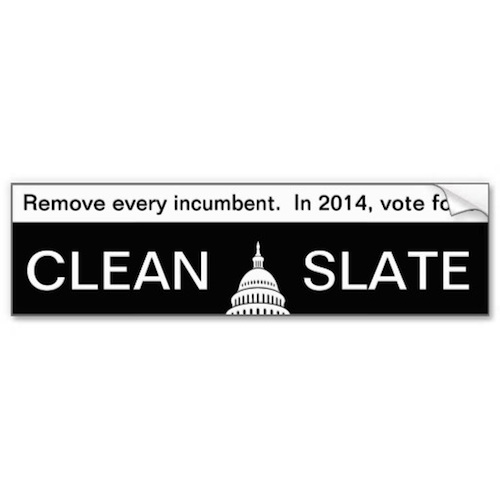Check out the chart above and some of the charts herein, and you could argue that the 2014 midterms have the highest anti-incumbent polling stance in about 22-24 years — seems like 68 percent of those polled are saying they want to “look around” at other candidates (f*ck, could you imagine if surveys about dating were phrased this way?) and 38 percent are saying “no” to their local candidate being re-elected (the latter data is from a poll this past fall).
But here’s where it gets confusing: people seem to want their elected official kaput, but the 2014 electoral picture doesn’t seem to have many toss-up races. Based on what political report you read, it’s somewhere between 28 and 44 on the House side; most believe that 350-390 seats are “safe” or “solid for X-party.” Cue the peanut gallery: Booooooring. Hopefully some of the Senate races will be more intriguing.
Alright, so now we have a little problem on our hands: the data says we’re gonna punt everyone out of office — like 1992, when 43 incumbents lost, or 2010, when 58 did — but there’s only 30 toss-up elections. So what’s going on?
1. Survey data is sometimes meaningless: In 1992, Pew Research data showed that less than half of those polled were in the above “looking around” category. 43 incumbents nonetheless lost. In 2010, 55 percent of those polled said they wanted their representative to keep his/her office. 58 incumbents lost; Obama called it “a shellacking” and Larry Sabato declared “his legislative Presidency is now over” (he had been President officially for about 18 months). Sometimes surveys just aren’t right.
2. We’re partisan as hell: This might be one of the bigger partisan divides in American history that we’re going through right now. You might hate your rep for X/Y-thing he/she did, but if he/she is GOP, you damn sure don’t want a Democratic in there, because goddamn, that boy be socialist! Or something like that. We’re divided enough that voting along the party/color line is a standard thing; my dad used to do that and feel guilty for not being diverse enough. I doubt people have that consideration nowadays.
3. Voting out requires action: It’s possible that people are resigned to the idea that Congress doesn’t do anything and it’s all headed in the wrong direction, in which case mobilizing people to the polls to oust an incumbent is a bit of an uphill battle.
4. Fenno’s Paradox: You bitch and bitch about Congress as a whole, but at the end of the day, you really do love your own Congressman/woman, so … eh … let’s give him/her two more years.
There’s probably other reasons I’m missing, but it’s an interesting overall picture. The cool thing is that there are some solid primary storylines on the 2014 front, such as Niger Innis in Nevada, etc. Overall, though, it doesn’t seem like Election Night 2014 will see a ton of shifts.


Is it any wonder? From the capital to your hometown all the politicians have lost the art of compromise. They ALL have to be right all of the time. Share if you agree with me.